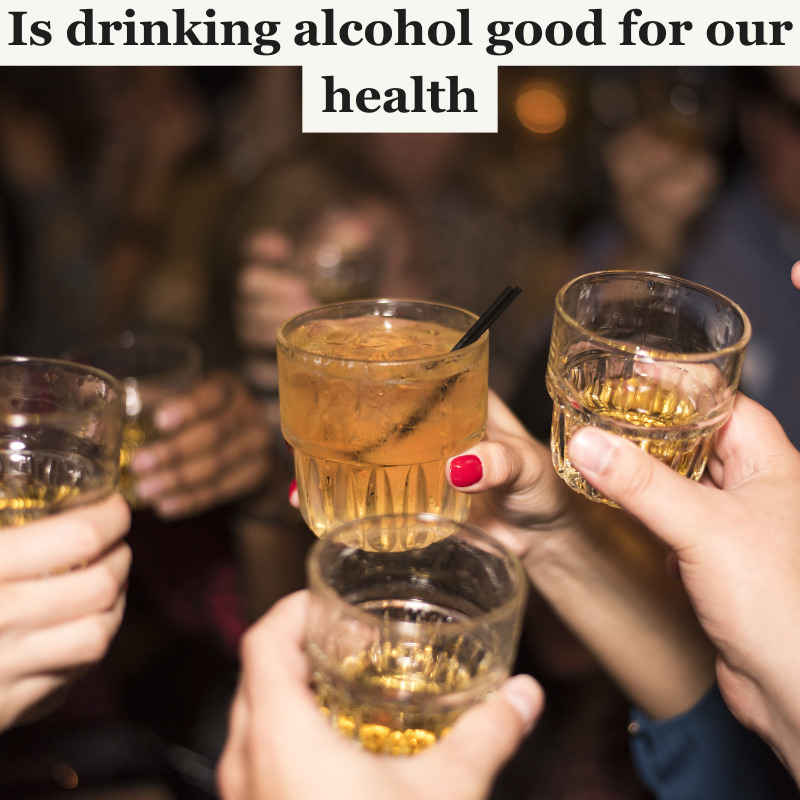Is alcohol beneficial for our health

During medical school, over a decade ago alcohol intake was safe as long as you drank the recommended 2-4 drinks per week. With newer research guideline, changes made recommend almost none.
It's frustrating to be given conflicting information.
Over a decade ago, the evidence pointed to moderate alcohol consumption to be cardioprotective, but further research shows that even tiny amounts can increase the risk of brain atrophy, neuroinflammation, breast cancer, and colon cancer. Not to mention cognitive decline and Alzheimer’s.
Because the older studies were observational, the data seemed to be tainted by a “healthy drinker bias.” Moderate drinkers were more likely to engage in healthier lifestyles over all of which skewed the data.
Alcohol is horrible for our brain. The metabolites or break-down products cause direct damage to the cells and tissues, causing cell death and brain shrinkage.
Alcohol impairs communication between brain regions by damaging the protective lining on brain nerves, which normally speeds up electrical signals. Chronic use leads to brain damage through neuroinflammation and mitochondrial damage.
The latest evidence
A 2022 European Society of Cardiology study found that the risks of atrial fibrillation and high blood pressure overshadow the potential heart health benefits of moderate alcohol consumption.
A 2021 review of Cancer Epidemiology emphasized that alcohol is a significant preventable cause of cancer. Risks increase even with as little as one drink per day, particularly for breast, colorectal, and liver cancers.
Some Blue Zone cultures, like Sardinia and Ikaria, integrate small amounts of alcohol (often wine) into daily life, associating it with social bonding and reduced stress. These benefits might indirectly contribute to longevity, even if the alcohol itself isn’t the driving factor.
Many health organizations like the world health organization, the American heart association and the dietary guidelines of America recommend abstinence or lowering the drink threshold to 1 drink for women or 2 drinks for men per day.
A lot of new research uses observational data that doesn’t prove cause and effect. Cultural norms, especially in nations with a history of strict alcohol restrictions, might influence abstinence-based advice more than scientific facts.
When you inspect the research, it's hard to accept the findings because they seem flimsy and flawed. The latest research lacks solid support. It's still unclear whether the people who abstained from alcohol got healthier because they avoided alcohol itself, or because they ate less or slept better. Their lifestyle improvement might be the reason, not the alcohol itself.
The evidence is clear it is harmful to the body, especially if one does not take much needed countermeasures to mitigate the negative effects on the body.
How we can prevent the negative effects of alcohol intake.
Quality sleep is by far the body's most efficient mechanism for repair and healing. Drinking alcohol disrupts the deep and REM stages of sleep, which are crucial for health and longevity. If drinking alcohol, limit 4-5 hours before going to sleep.
Even though some guidelines recommend 1-2 drinks per day, it is prudent to give the body time to recover. Daily drinking can compound negatively effecting your health. Take a few off from the booze bottle.
If you are not exercising to counteract the negative health gut punch of drinking, then you are missing out. Exercise amplifies liver detoxification by improving the metabolism. While alcohol causes systemic inflammation, exercise fights inflammation positively preventing the long term negative health consequences. It also protects the brain. Although alcohol causes brain shrinkage and cognitive decline, exercise stimulates the creation new brain cells, BDNF and increased blood flow to support brain power.
Antioxidant rich foods should be the next obvious answer. Since alcohol causes the increased production of free radicals consuming foods rich in antioxidants will defend the body from excessive cellular damage. Be intentional when you are eating after a day of drinking. Pile on the antioxidants.
We lose vitamins and minerals because of excessive alcohol consumption. Supplement stack to prevent the health impact. Zinc, magnesium, NAC, Milk thistle, B vitamins, probiotics, and vitamin C.
Bringing it home
I am always about the balance. Blanket statements about abstinence often reflect an overly simplistic, all-or-nothing approach. It tries to address a complex issue by taking a zero-tolerance approach. We shouldn't overlook the unique blend of social, mental, physiological, and environmental traits that every individual possesses. A healthy, fit person with no medical issues would have a very low risk of getting sick from drinking the occasional small drink. The other side of the coin is we can’t prevent everyone from drinking, so why not provide a way to mitigate risk. I think everyone has little joys or vices to deal with the stressors of life. NO judgement if you drink. In the end, less is better and none is safest.